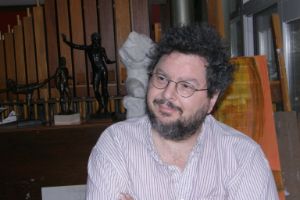Lecture
David Gelernter
Anti-computing and the anti-Web: Remembering how to read
Introduction: Manfred Lahnstein

David Gelernter
David Gelernter is researcher into the future – the future of people and the future of technology. Because the latter governs our lives more and more, its development has become inseparable from that of life in society. Gelernter’s idea of allowing computers to work in parallel (parallel computing), in 1991 made him one of the precursors of the internet.
He wishes to align computers more closely to human brain functions – and not the other way around. In his view conventional desktop computers do more to inhibit the information age than they do to promote it: they have not increased out knowledge of the world, just the information available on how they function. “In the future we will be connected to ‘cyberbodies’ living in a computer cosmos – which can also be described as a ‘swarm’ or ‘cybersphere’. We can gain access to this ‘swarm’ at various locations using chip cards.” This vision from the year 2000 has now been realised in social media and the ‘cloud’. It is one of Gelernter’s central ideas that the less evident a medium is, the more it can serve our and its purpose. “In the future we will have all kinds of technology and the beautiful thing about it will be that we don’t have to think about technology any more. We will be grateful and relieved to be able to go back to the things that really count.” But what is it that really counts?
The American David Gelernter (*1955) read Jewish Studies and Information Studies at Yale University, where he now teaches Computer Science. He has written numerous books on information and Judaism and is a novelist and painter. In 1993 he was injured by a letter bomb from the ‘Unabomber’ Ted Kaczynski.
David Gelernter in his own words on his Berliner Lektion:
“The Web helps dilute the power of language: modern digital text isn’t worth careful writing or reading, because it will soon be replaced by even more digital text. The Web is history’s most important source of bad writing, and is helping to make careful editing and careful reading obsolete. Email and text messages are probably the sloppiest, least nuanced form of written communication since the rise of literacy. Exchanging the power of words for the power of electronics is (at best) a Faustian bargain, at worst a plain disaster. It’s more important for art today to counteract computers than to conspire with them – and to remind us of the meaning of careful reading and the emergence of art out of the power of the word.”